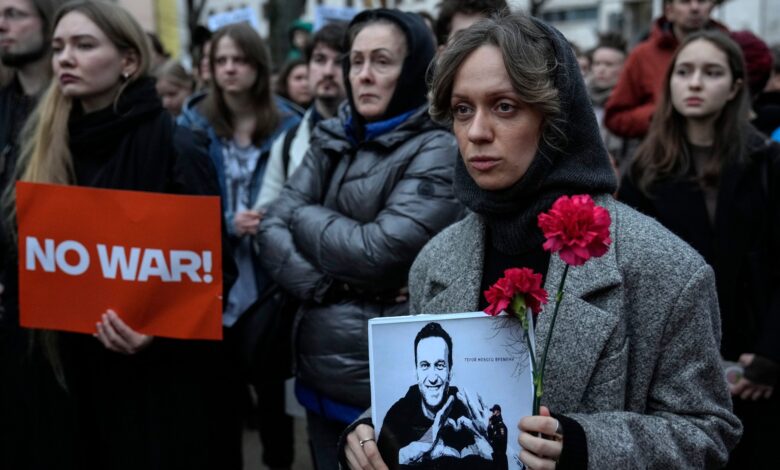Why Navalny was hated in the Kremlin and in some Western circles

It doesn’t matter what caused the death of Russian politician Alexey Navalny; he was killed by Vladimir Putin’s regime.
It was a slow execution that started with his poisoning with the Novichok chemical agent in 2020 and proceeded with sadistic torture in prison after his insanely daring move to return to Russia in January 2021.
The official version about a blood clot suddenly killing the 47-year-old politician on Friday may or may not be true, but the blame for his death still remains squarely with the Russian president.
Navalny was outstanding in every sense. Head and shoulders above all Russian and likely all contemporary European politicians in terms of charisma and bravery, he was a figure of hope that exuded immense optimism and displayed an irresistible sense of humour until his very last days in prison in the Arctic.
He was a character akin to the Hummingbird in Salman Rushdie’s Midnight’s Children, a charismatic politician trying to prevent the spilt of the newly independent India. Navalny was a highly inspiring and unifying personality that was capable of bringing together what was breaking apart in this current epoch of conflict and polarisation.
With his anticorruption crusade that exposed the illicit riches of top regime figures in a series of brilliantly produced YouTube videos, he built a vast support base and Russia’s biggest regional opposition network. He brought together liberals, nationalists and left-wingers – everyone who was tired of the corrupt securitocracy that has ruled Russia for a quarter-century.
Navalny took opposition politics out of Moscow and St Petersburg into distant regions and small towns. Internet-savvy and very well versed in contemporary culture, he brought about a generational shift in the ranks of Russian opposition. His following to a large extent comprised 20-somethings or even teens who have never experienced any other political regime than Putin’s.
He embodied the hope that changes could be brought about by non-violent resistance in the style of the velvet revolutions that brought down the communists in 1989-91. Born to a Ukrainian father and having spent some of his happiest childhood days in Ukraine, Navalny could have also potentially helped mend the rift between the two neighbours currently locked in a bloody war.
Although his death is squarely on Russia’s political leadership, the hope he represented was shattered by the renewed geopolitical confrontation between Russia and the US-led West. He was a thorn in the eye of the beneficiaries of this conflict – first and foremost among them being Putin himself.
But Navalny and his movement were also an object of incessant bashing by anti-Russian troll farms and hawkish pro-Ukrainian figures linked to the military-industrial complex and securitocratic blobs in the capitals of NATO countries.
Accusations thrown at Navalny boiled down to him being a Russian nationalist who would have done the same thing as Putin – but perhaps even more efficiently because he would have clamped down on corruption.
In the beginning of his political career, Navalny indeed flirted with far-right politics, but he drifted away from it to straightforward pro-Western liberalism a long time ago.
There is no straightforward answer to the question of how Navalny would have acted had he indeed become the Russian president instead of Putin. It is indeed difficult to say to what extent all that happened between Russia, Ukraine and the West was about personalities. It is important to remember Putin himself underwent an evolution from a West-backed nominee of the Russian liberal elite to a murderous authoritarian – a process in which the West’s frivolous and arrogant attitude to Russia’s core security interests played no small role.
A few weeks into Russia’s full-out invasion of Ukraine two years ago, one of the main spokespeople for the Ukrainian government at the time, Oleksiy Arestovych, said that a Russian liberal-democrat president would have also invaded Ukraine in the same manner – such was the logic of geopolitical confrontation.
That kind of thinking presumes that the US-led West was intent on humiliating Russia in the way no Russian leader would have ever accepted – delivering a strategic defeat upon it. That’s indeed something that many hawkish commentators in the West are calling for today.
Navalny was first and foremost a Russian politician, which is why he made what felt like a suicidal choice to return to Russia after surviving the poisoning.
That was the only way to remain politically relevant in Russia. He didn’t want to be anyone’s stooge. In the West, he would have been at best like General Charles de Gaulle in London during World War II – mistrusted and isolated. How would have he managed the insane xenophobic attacks on social platforms his exiled allies are being subjected to on a daily basis now? How would have he reacted to visa and travel restrictions that harm anti-Putin Russian exiles to a much greater extent than the supporters of the regime?
Unlike de Gaulle, he would have had few chances of returning and playing a role as the geopolitical conflict was strengthening Putin’s regime and threatening to usher another half a century of cold war and iron curtains in Europe.
In Russia, he thought he could at least gamble on the growing war fatigue and become an East European version of Nelson Mandela, waiting for the hour of freedom.
Had he miraculously succeeded in coming to power, he would have still faced a very hostile West inclined towards defeating and humiliating Russia rather than finding a common language and an uneasy compromise.
Yet, he was a very different man than Putin in that he was simply not the kind of politician who thrived on conflict. He was not a man from the current epoch of confrontation and polarisation. He perhaps belonged to the better future that Eastern Europe may still attain after years of misery.
Would he have succeeded in finding compromise-leaning interlocutors in the West and sidelining trigger-happy hawks? He would have had a fair chance. This is why he was such an unloved figure in those circles.
Navalny is a tragic figure and in that sense perhaps only comparable to Ukraine’s Volodymyr Zelenskyy – initially a highly unifying pro-peace figure who is now forced to wage an increasingly hopeless battle against the grand master of conflict, Vladimir Putin.
But Navalny has nurtured a generation that may have dozens or hundreds like him in its ranks who can work to achieve the “beautiful Russia of the future” as he famously called it in his main political manifesto.
The views expressed in this article are the author’s own and do not necessarily reflect Al Jazeera’s editorial stance.



